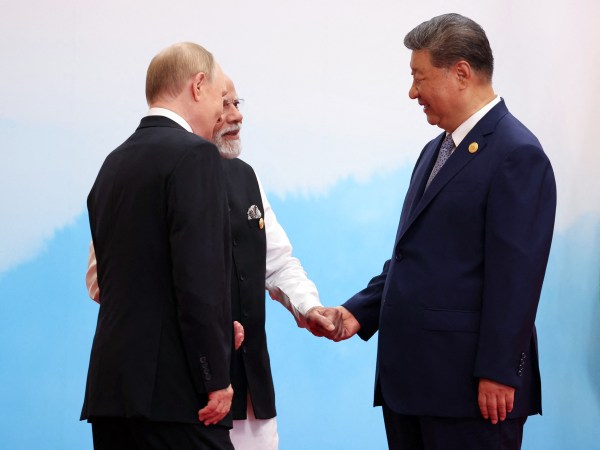Turn any article into a podcast. Upgrade now to start listening.
Premium Members can share articles with friends & family to bypass the paywall.
We like to quote from A Man for All Seasons around here—you know: “Give the Devil the benefit of law,” “but for Wales?” etc. There is much that is wonderfully wise in Robert Bolt’s play and the beloved film adapted from it. But one of his maxims is at best incomplete, with Thomas More making this brief case against Thomas Cromwell’s cynical realpolitik and amoral pragmatism: “When statesmen forsake their own private conscience for the sake of their public duties, they lead their country by a short route to chaos.”
Chaos is where we are.
By what short route did we arrive here? In no small part, through the private conscience—one that is extraordinarily deformed—of Donald Trump, the Mammon-worshiping imbecile who is, if not exactly a statesman, nonetheless president of these United States. More’s advice assumes two things: 1) a more or less princely executive 2) who is in possession of a functioning and educated “private conscience.” (A note to consider at another time: The most significant error of our romantic friends is the belief that the conscience does not need educating.) Our Founding Fathers, having had the benefit of learning a good deal from the two and a half centuries that had passed between More’s martyrdom and the framing of our constitutional order, chose not to rely on the private conscience of a monarch or an elected executive with monarchical powers: They set limits on the overall national government and made the executive answerable to the legislature rather than the other way around.
As a non-paying reader, you are receiving a truncated version of Wanderland. You can read Kevin's full newsletter by becoming a member here.
On that point: We do have a separation of powers, but we do not have three “coequal” branches of government. Congress can override a presidential veto, but the president must accept the final judgment of Congress; Congress exercises oversight of the executive, which has no reciprocal power over the legislative branch; Congress has a say in senior executive appointments, while the president has no say in congressional staffing; the major powers of the state—laying taxes, appropriating funds, declaring war, ratifying treaties—are invested in Congress, not in the president. What the executive has is not equality but independence across a narrowly defined scope of action, powers that are intended as a check on what turns out to be, in our time, the least dangerous “threat” in American public life: excessive legislative ambition from such gormless castrati as Ted Cruz, Mike Johnson, John Thune, Bill Cassidy, and the rest of the knee-walking sycophants of the so-called Republican Party, who cannot muster the patriotism, self-respect, or manliness (a strange obsession among these perfect exemplars of impotence) to stand up for their country (to say nothing of Congress as an institution) in the face of the abuses, usurpations, corruption, stupidity, quackery, incompetence, buffoonery, servility, tyranny, cowardice, and Putinist water-carrying—I could go on—of the Trump administration and its fellow travelers.
The flaw in our constitutional architecture was identified early on by John Adams: “We have no Government armed with Power capable of contending with human Passions unbridled by morality and Religion. Avarice, Ambition, Revenge or Galantry, would break the strongest Cords of our Constitution as a Whale goes through a Net. Our Constitution was made only for a moral and religious People. It is wholly inadequate to the government of any other.” Americans often are uncomfortable talking about the role of religion per se in moral life, though the matter is of occasional interest to our evangelical Christian friends, who have for the past decade or more been so studiously ignoring the issue of how Trump’s gross personal immorality is wrapped up in his warped religious beliefs, which are essentially heretical and are saved from rising to the level of heresy per se only because the president is too thoroughly illiterate to produce a thought meaningful enough to qualify as such. As my colleague Jonah Goldberg observes, efforts to construct a coherent political philosophy for Trump are doomed to embarrassing failure because the president categorically rejects the premise that there are principles that should bind him, and so Trump’s apologists fall into rank, servile personalism, their only guiding light being: “Trust Trump.”
The morality and character of public men, as I keep repeating, is not merely a metaphysical matter, something to consider in light of the hereafter: It is an eminently practical concern. Trump’s character is low, to be sure, but its lowness is not its distinguishing characteristic: The defining feature of Trump’s character is its immaturity. Donald Trump is a man who soon will be 80 years old with the character of a 2-year-old, who can discern no higher good beyond: “I WANT!” His lack of moral education is comprehensive. It is not easy to get a little boy to see beyond his own immediate wants (take it from a father of one 3-year-old son and three 1-year-old sons) and to incorporate into his mental model of the universe the fact that there are good and necessary things that do not align with his immediate urge to eat ice cream or kick his brother in the face. Moving a little man out of the cozy, shaded confines of the moral nursery and into the sunshine—the project of moral education—is about seven-tenths of what fatherhood is about. Donald Trump has never grown out of moral nap time: He somehow made it from childishness to second childishness without an interval of genuine moral adulthood. How his father failed him.
Donald Trump is not making war on the First Amendment in particular and on free speech more generally because he has some idea about it: He just doesn’t like what they say about him on ABC News. The American economy is struggling under an idiotic new tax regime instituted with no legal basis and disrupting supply chains around the world not because Trump has an economic theory worth the name but because he has a wounded sense of unfairness based on absolutely nothing other than his own feelings. The Trump administration is effectively on Vladimir Putin’s side in Russia’s war on Ukraine—while the United States is as a matter of public policy on the other side—because Putin has flattered him. Trump has been out swanning around Windsor Castle with the British royals not because he is seeing to urgent business but because he likes the shiny things and because spending time with solicitous kings makes him feel like a very special little boy, indeed. (Here, the ghosts of Valley Forge shake their spectral fists and wonder why, after all, they suffered such an ordeal.) We have an ad hoc new immigration policy—again, one with no actual legal basis for the extent of its transformation—because Donald Trump is made nervous by Mexicans, to the extent that he distinguishes them from Nicaraguans or Dominicans or Guatemalans. We have skyrocketing public debt because Trump wants to eat his dessert first and because Mike Johnson is too much of an insipid moral nonentity to tell him he has to eat his spinach, too. We have the White House trying to stage a military occupation of American cities because the president is not the great negotiator he pretends to be but a schoolyard bully, walking around the world like the love child of Augustus Gloop and Veruca Salt.
A short route to chaos, indeed. Very short.
Words About Words
Here is an interesting story: The same genetic factors that cause a disease in women (one associated with ovarian cysts) also can be passed on to men, with ill effects including elevated rates of obesity, diabetes, and male-pattern baldness. But observe, if you dare, Slate’s Niranjana Rajalakshmi and her utter inability to simply write that in English.
Start with the headline (for which we must blame the editors, not Rajalakshmi).
It’s Considered a “Women’s Condition.” It Shouldn’t Be.
Researchers say that PCOS can affect people across ages and genders.
Interesting!
True?
No!
Keep reading and you’ll start to encounter the contemporary idiom that leads to so much confusion, with phrases such as “women and people with ovaries.”
Look up polycystic ovary syndrome, or PCOS, and every definition you find will state that the hormonal disorder manifests in women and people with ovaries of reproductive age. There’s much that scientists still don’t know about PCOS, including how to cure it. But if you do know one thing about the condition, I’d guess that it’s the fact that it occurs in women. Unfortunately for the rest of the spectrum of ages and genders, there’s more to the story. PCOS can affect men and children, too.
Interesting!
True?
No!
While people without ovaries can’t technically be diagnosed with PCOS …
Oh.
So then, 273 words into the thing:
While people without ovaries can’t technically be diagnosed with PCOS, research shows they can inherit the same genes that cause PCOS in women, leading to what scientists call the “male equivalent of PCOS.” When men inherit these PCOS genes, they don’t develop reproductive problems like their female relatives would. Instead, they may have metabolic problems like obesity and insulin resistance, which increase their risk of diabetes and heart disease. Early male-pattern baldness is also associated with PCOS genes.
So, the actual story is more like: “Genetic factors that produce a common reproductive disorder in women are associated with a different set of problems in men.”
Doing violence to both fact and language in the service of a parochial and vulgar social-justice agenda is silly and destructive, and I very much doubt that it does anything that is actually helpful to people who struggle with the phenomenon misnamed “gender dysphoria.” But what this really reminds me of is the climate-change debate, which can be understood as a series of statements that proceed in order of increasing unlikeliness, beginning with “Global warming is a real thing” and proceeding through various increasingly contestable steps up to “The set of radical economic and social policies endorsed by the most aggressive subset of climate activists will produce the desired results at an acceptable cost.” “Yes,” to the former, “I don’t think so,” to the latter, and, somewhere in between, many of us might reach a consensus around a policy such as cap-and-trade.
In the parallel trans discourse, we begin with “Some people feel at odds with their sex,” to “‘Trans women’ are women, in the same sense that ordinary biological women are women,” to “It is morally necessary that everybody behave and talk as though they believed that ‘trans women’ were women in the same way as ordinary biological women.” And then people write as though this were a truth both universally recognized and self-evident, which leads to all kinds of ghastliness and illiteracy. I suspect that many of us could sign off on a consensus in the neighborhood of, “The subjective experience of sexual identity is complicated, and we should, within reason, more or less treat people the way they want to be treated and interact with them socially in the way they prefer, and that we should do our best to be generous and accommodating whatever our personal feelings about the issue; obversely, this implies an obligation on trans people to also be generous and accommodating when it comes to placing social demands on people that may seem to those people excessive or unreasonable.”
(The obverse is used to indicate the side of a coin we colloquially call heads in American English, the reverse being tails. I like obversely rather than conversely because the word suggests simply the other side of the coin rather than opposition, as in contest or conflict. Reversely just doesn’t work, and, besides, it would suggest regression, moving backward, which isn’t what I intend.)
On this point, I say: People with ovaries, unite! People without ovaries, too! You have nothing to lose but the chains of painfully constricted usage and cringe-inducing preciousness!
Elsewhere
You can buy my most recent book, Big White Ghetto, here.
You can buy my other books here.
You can check out “How the World Works,” a series of interviews on work I’m doing for the Competitive Enterprise Institute, here.
You can find some of my recent Competitive Enterprise Institute work, on wine tariffs, in the Washington Post.
You can listen to me discussing AI and regulation with Adam Thierer on The Dispatch Podcast here.
You can listen to me getting testy—but not testy enough for some listeners!—about whataboutism on The Dispatch Podcast here.
You can listen to me interviewing Adam Lankford about ideologically motivated mass violence, along with the role of video games and sexual frustration on that phenomenon, on The Dispatch Podcast here.
You can listen to me sitting in for Jonah Goldberg on a special coup d’pod episode of The Remnant here. The guest is Dan Wang, the subject is China and the “engineering state.”
In Closing
My colleagues at the Competitive Enterprise Institute this year honored professor James Otteson, the great scholar of Adam Smith, with the Julian L. Simon Memorial Award. The keynote speech at the dinner honoring professor Otteson was given by Hernando de Soto, the brilliant Peruvian economist and political thinker, who framed the U.S.-China relationship as a philosophical contest between Adam Smith and Karl Marx. (Dan Wang would not agree, I think.) De Soto, who is a figure of world-historical importance, is (if we can trust Wikipedia and my English-major math) 84 years old, but he looks and talks like a man of about 70—and I mean a good 70, a J. K. Simmons 70 and not a Diego Rivera 70.
Julian Simon is famous for winning a public bet with Paul Ehrlich, the Population Bomb author who has been spectacularly wrong about every major public issue upon which he has issued a public opinion since 1968. Simon is also famous for a book in which he describes human beings as “the ultimate resource.” Human beings, he argued, are assets, and the Malthusian error is in thinking of them as liabilities.
Simon was right, and he won his bet, but our political conversation still proceeds as though Erlich had been on the right side, too often speaking of human beings as mouths that have to be fed instead of hands that can work and brains that can think. We worry that in the age of AI, there won’t be enough jobs to go around instead of understanding that new tools have always given human beings new capabilities, which we can use for wonderful ends or horrifying ones. There are a lot of different things you can do with an axe: You can build a house, or you can murder an enemy. And even if you only want to use the axe to chop down trees, its usual purpose, there is a great deal of thinking that needs to be done about which trees should be chopped down and when. That takes wisdom and specific knowledge, often local knowledge—it is the sort of decision that will go poorly if you try to do it by means of a vote or a poll.
Adam Smith wasn’t an economist as we use the term today—he was a moral philosopher, a contributor to that moral education I wrote about above. Professor Otteson has done a good service through his explication of Smith’s thought and legacy, and we would be better off if more Americans—and more of the world at large—would avail themselves of the benefits of his work.








Please note that we at The Dispatch hold ourselves, our work, and our commenters to a higher standard than other places on the internet. We welcome comments that foster genuine debate or discussion—including comments critical of us or our work—but responses that include ad hominem attacks on fellow Dispatch members or are intended to stoke fear and anger may be moderated.
With your membership, you only have the ability to comment on The Morning Dispatch articles. Consider upgrading to join the conversation everywhere.